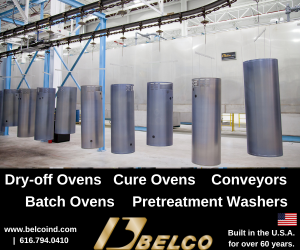energy
Coating Analysis
What are the most energy-intensive areas one can intervene in a standard coating process?
Read MoreSelf-Cleaning Solar Panel Coating Optimizes Energy Collection, Reduces Costs
The accumulation of dust and sand on solar power reflectors and photovoltaic cells – also known as soiling ‑ is one of the main efficiency drags for solar power facilities, often reducing reflectivity up to 50 percent in 14 days.
Read MoreInfrared Curing: Evaluating the characteristics of IR energy
Infrared (IR) energy can be used as a source of heat to cure a variety of industrial coatings. Such infrared curing applies energy to the coated part surface by direct transmission from an IR emitter, which can provide source temperatures of anywhere from 500 to 4,200°F
Read MoreCoating Options for Steel
We manufacture steel and aluminum mounting structures that are used to support solar panels in a variety of environmental conditions. Where might I find information on wet-coat processes we might consider and compare to powder coat?
Read MoreHigh-Energy Mass Finishing
We produce two parts that cannot be deburred in our bowl vibratory machine. Is there another finishing system that would deburr these parts?
Read MoreOxford U. Researchers Win Prize With Solar Coatings
Develop a hi-tech coating with the potential to significantly reduce the manufacturing costs of new-generation solar photovoltaic cells.
Read MoreOne Company’s Junk is Another Company’s Plastic Rake
Manufacturing Research Center at Western Michigan University received nearly $1 million from the U.S. Department of Energy to develop a “green manufacturing initiative” to study and reduce the amount of powder coating waste going to landfills.
Read MoreMechanical Vapor Recompression Evaporation
MVRE is underutilized in the treatment of industrial wastewaters that are typical of metal fabricating and finishing industries. Increasing energy costs, rapidly decreasing freshwater resources, and growing sensitivity towards the environmental impact of industrial management practices are the driving forces in the development of more sustainable technology.
Read MoreNon-chromated Conversion Coating for Magnesium Alloys and Zinc-Nickel Plated Steel
A novel hexavalent chromate-free conversion coating was developed to improve anti-corrosion and adhesive-bonding characteristics of the magnesium alloys and zinc-nickel (Zn-Ni) plated steel substrates. The corrosion behavior of the coated and uncoated alloys was investigated by neutral salt fog (NSF) and electrochemical corrosion tests. Surface wettability of the pretreated substrates was investigated by static contact angle measurements. Wet-tape adhesion tests verified that there is strong adhesion between the primer and the chem film-treated substrates. The morphology and composition of the coated surfaces were investigated by optical microscopy (OM), scanning electron microscopy (SEM) and energy dispersive x-ray spectroscopy (EDX) methods. This trivalent chromium-based surface treatment is a potential hexavalent chromate conversion coating replacement for magnesium alloys and Zn-Ni plated steel.
Read MoreSteamed Over Heating Costs? Try Gas For Your Finishing Shop
The cost of natural gas in the U.S. is at record lows—about where the rates were in the mid-1970s—causing many in the plating industry who need to heat tanks to search for alternative avenues to curtail their rising energy costs.
Read More















